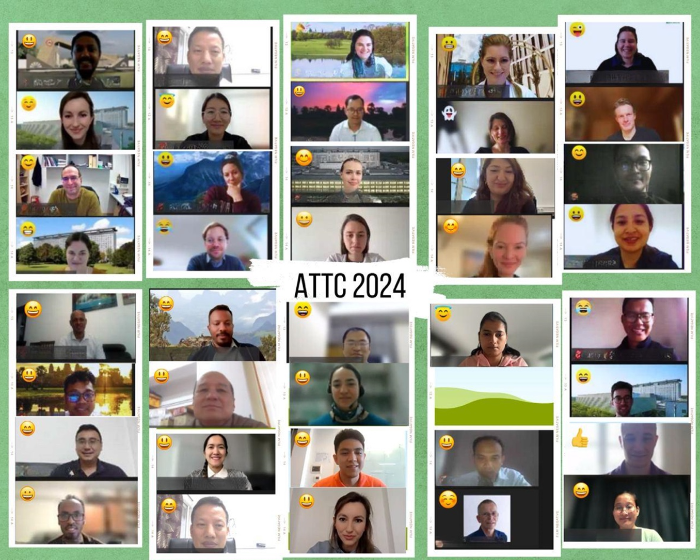
The 2024 edition of the Academic Teacher Training Course once again offered some interesting new highlights and turned out to be even more diverse than in previous years. For the first time, a group from Cambodia took part, meaning that the course simultaneously covered five different time zones with participants from four different continents. An exciting starting point for an intensive further training course for health professional educators and in itself a great challenge to take into account the different cultural requirements in terms of organization and to accommodate all participants well. Only possible with a strong team of international facilitators from Asia, Africa and Europe and an intercultural sensitive approach in the concept and the grouping of participants.

Online Course Week
Before the main sessions, different new activating exercises kick-started the course days of the online course week. Ad hoc with the course’s objectives, some of these activities included physical activity and mindfulness by incorporating the ancient principle of medicine and health, “Mens sana in corpore sano”. The stretching exercises were designed to overcome the prolonged sitting that the course required. One of them was animated by the physiotherapist Carolina Luque, and another was a fun stretching exercise where you had to write your own name by forming letters with different body positions animated by Tsedeke Asaminew. In addition, there was an inspiring mindfulness exercise to start the day with a thought of gratitude led by Karma Tenzin. The intercultural teaching module facilitated by Marie-Cathérine Rausch provided insights and opened new perspectives regarding the importance of intersectionality within the teaching environment and the advantages of understanding other cultures to become better teachers and healthcare providers by integrating the different needs of a diverse target group.
In addition to providing knowledge about pedagogical methods and new technological tools to support interactive teaching instructed by Noemi Castelletti, the role of AI in teaching and learning and the high responsibility of teachers in its application was tackled intensively in a case-based discussion, guided by Matthias Siebeck and other international facilitators. The course included many practical and entertaining elements ranging from a step-by-step workshop about lesson planning to fun videos produced by the participants about ‘do's and don'ts’ in online teaching. Furthermore the peer group consultation where professional challenges were discussed in a structured way to develop as many solution ideas as possible, and finally the assessment circle with innovative assessment methods such as ‘Entrustable Professional Activities (EPA)’.
As every year, the highlight of the week was the micro-teaching session, a hands-on activity where each participant recorded themselves in real time while the rest of the group analysed the teaching performance to receive and give individual feedback and improve teaching skills virtually in front of a camera.
The feedback session was also very enlightening as it covered from philosophy to psychology, by enabling participants to understand how powerful these inputs are; not only for the students but as well for the teachers and institutions in order to improve and stay up to date with the ever-changing demands and settings of quality education.
After this very intensive week of courses, the ATTC participants are now trying out their new interactive lesson plans following Gagné’s 9 steps of Instruction in the transfer part of the course. As not all participants have a teaching assignment, the ATTC Teaching Day 2024 was offered on April 26 to try out their lesson plans. Another opportunity to refresh what they had learned from the online course week and put theory into practice
Written by: Carolina Rivera Luque and Marie-Cathérine Rausch
Online Symposium
We are excited to share that on July 26th, 33 academic teachers from all over the world successfully completed this year’s Academic Teacher Training Course during the final Online Symposium. This cohort brought a unique energy to the program, with each participant showed exceptional commitment and was eager to improve their teaching practices.
A special highlight of this year’s course was the involvement of our student exchange group. 5 German and 6 Ethiopian medical students took on the role of student chairs during the sessions. Their active participation and feedback from a student perspective provided valuable insights that enriched the learning experience for all involved.
Throughout the course, participants showcased their newly acquired skills by presenting innovative approaches to interactive and technology-enhanced teaching. These presentations demonstrated the practical application of concepts learned, underscoring the course’s impact on their professional development.
We thank all the academic and student chairs who hosted these sessions and contributed significantly to the success of the completion of the course.
We congratulate all participants on their achievements and look forward to seeing how these new ideas will influence their future teaching endeavors and improve the quality of health professions education!
Written by: Marie-Cathérine Rausch

